|
|
|
Sort Order |
|
|
|
Items / Page
|
|
|
|
|
|
|
| Srl | Item |
| 1 |
ID:
123792
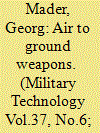

|
|
|
|
|
| Publication |
2013.
|
| Summary/Abstract |
The range of potentially looming or very real threats is broad, as are the assets already used today, be it, Iran's underground nuclear enrichment sites or Islamist irregulars in Toyotas. This survey is a stroll through recent selected developments in modern air to ground weapons (ATGW) countering these threats.
|
|
|
|
|
|
|
|
|
|
|
|
|
|
|
|
| 2 |
ID:
079656


|
|
|
| 3 |
ID:
128140
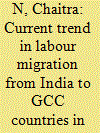

|
|
|
|
|
| Publication |
2014.
|
| Summary/Abstract |
Migration and movement of human population have always been an integral element in the history of mankind. India has been experiencing large-scale migration to foreign countries since centuries and in the current globalised era. The International Labour Organization - ILO has classified international migration for employment in to two major categories including settlement migration and contract migration (ILO, 1989). The contract migration is unique phenomenon practiced in few western countries but in particular in the GCC countries post oil boon during 1970's as the governments used sharply higher oil revenue to build infrastructure and housing, and expand the economy (Seccombe, 1985).
|
|
|
|
|
|
|
|
|
|
|
|
|
|
|
|
| 4 |
ID:
102017
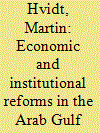

|
|
|
|
|
| Publication |
2011.
|
| Summary/Abstract |
Over the last decades, Dubai has applied an economic developmental model which is strongly pro-business, emphasizes market liberalism and economic openness, and embraces globalization, while at the same time refraining from challenging the traditional neo-patrimonial leadership structure in the country. As such, the "Dubai model" has so far been distinctly different from economic models applied in the other GCC countries. However, judging from official statements, development projects under implementation, and the effort currently expended in creating economic assets in the other GCC states, these states seem to be embracing the "Dubai model" of development. This article will analyze the claim that the "Dubai model" is displacing the rentier state model as the general developmental model among the Gulf countries.
|
|
|
|
|
|
|
|
|
|
|
|
|
|
|
|
| 5 |
ID:
127052
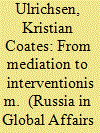

|
|
|
|
|
| Publication |
2013.
|
| Summary/Abstract |
During the first two years of the Arab Spring, Qatar's regional posture went into "overdrive," initially in Libya and subsequently in Syria. The country took advantage of the unique niche which it had spent years crafting in order to play an astoundingly high-profile and increasingly controversial role in the uprisings. Initially, it displayed unprecedented regional leadership bordering on outright activism in responding to crises across the Arab world. This greater self-confidence reflected multiple factors, including (relative) domestic stability and a progressive form of governance, as well as the ability to take and execute decisions quickly and the aforementioned experience in mediation. As a result, at the onset of the Arab Spring protests across the Middle East and North Africa, Qatar boasted a distinctive combination of characteristics rare in the Arab world, including regionally and internationally recognized legitimacy, a relatively progressive stance towards governance, an ability to make swift policy decisions, and extensive experience in mediation. All of these factors positioned Qatar to assume an extraordinarily visible and interventionist role during the Arab Spring upheaval.
|
|
|
|
|
|
|
|
|
|
|
|
|
|
|
|
| 6 |
ID:
127573
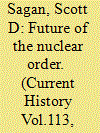

|
|
|
|
|
| Publication |
2014.
|
| Summary/Abstract |
Scholars should be modest when making predictions about the future of nuclear weapons. After all, pundits, professors, and presidents alike have made radically inaccurate nuclear predictions in the past. "In that terrible flash 10,000 miles away," the journalist James Reston wrote in The New York Times
immediately after Hiroshima and Nagasaki, "men here have not only seen the fate of Japan, but have glimpsed the future of America." A group of Manhattan Project scientists similarly argued, "The whole history of mankind teaches . . . that accumulated weapons of mass destruction 'go off' sooner or later, even if this means a senseless mutual destruction." Yet the United States has not used nuclear weapons in combat since 1945 despite many opportunities to do so during Cold War crises, in Korea and Vietnam, or during the 1991 Gulf War against Iraq.
|
|
|
|
|
|
|
|
|
|
|
|
|
|
|
|
| 7 |
ID:
123715
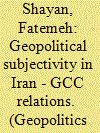

|
|
|
|
|
| Publication |
2013.
|
| Summary/Abstract |
This article enters into the debate about geopolitical subjectivity between Iran and the members of the Gulf Cooperation Council (GCC) on the three islands issue. The islands at the Western entrance to the Strait of Hormuz have so far been examined as an issue between Iran and the United Arab Emirates from historical, sovereignty and law perspectives, but this article examines the argument that the GCC has become a geopolitical subject through its support for the US policy of isolating Iran. Geopolitical subjectivity, a concept building on Pami Aalto's conceptual scheme, is the concept of goal-oriented ordering of territories and political space. We can use it to identify the GCC institution as a subject with the ability to act (and abstain from acting) and to examine Iran's response to the GCC's willingness to order the three islands. The conclusion is that the GCC became a subject in this context as soon as it felt the benefits of US support and the current rise of the soft power of Qatar. Even so, it has been unable to undermine Iran's sovereignty rights over the three islands, and the issue has strengthened, even exaggerated, states' adherence to the concept of sovereignty throughout the Persian Gulf region.
|
|
|
|
|
|
|
|
|
|
|
|
|
|
|
|
| 8 |
ID:
058546


|
|
|
| 9 |
ID:
129848
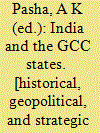

|
|
|
|
|
| Publication |
DelhI, Wisdom Publications, 2014.
|
| Description |
iii, 463p.Hbk
|
| Standard Number |
9789381505687
|
|
|
|
|
|
|
|
|
|
|
|
Copies: C:1/I:0,R:0,Q:0
Circulation
| Accession# | Call# | Current Location | Status | Policy | Location |
| 057723 | 327.54053/PAS 057723 | Main | On Shelf | General | |
|
|
|
|
| 10 |
ID:
068720
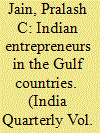

|
|
|
| 11 |
ID:
064731


|
|
|
|
|
| Publication |
Apr-Jun 2005.
|
|
|
|
|
|
|
|
|
|
|
|
|
|
|
|
| 12 |
ID:
052633


|
|
|
| 13 |
ID:
129876
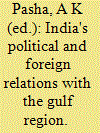

|
|
|
|
|
| Publication |
DelhI, Wisdom Publications, 2014.
|
| Description |
iii, 426p.Hbk
|
| Standard Number |
9789381505694
|
|
|
|
|
|
|
|
|
|
|
|
Copies: C:1/I:0,R:0,Q:0
Circulation
| Accession# | Call# | Current Location | Status | Policy | Location |
| 057724 | 327.54053/PAS 057724 | Main | On Shelf | General | |
|
|
|
|
| 14 |
ID:
089126
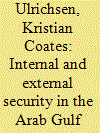

|
|
|
|
|
| Publication |
2009.
|
| Summary/Abstract |
This paper examines how the concept of "Gulf security" is evolving as internal political and socioeconomic changes in the Gulf states interact with the process of globalization and the impact of international events in this volatile region.
|
|
|
|
|
|
|
|
|
|
|
|
|
|
|
|
| 15 |
ID:
124463


|
|
|
|
|
| Publication |
2013.
|
| Summary/Abstract |
Da (Mother): Memoirs of Seyyedeh Zahra Hoseini, as Recorded by Seyyedeh A'zam Hoseini was published by Sureh-ye Mehr, the official publisher of the Artistic Center of the Islamic Development Organization, in 2008. According to the publishers, it became the biggest seller in the shortest period in Iranian publishing history. This article analyzes the conditions of production, distribution and reception of that work, and compares it to the canon of other contemporary Iranian war narratives. It argues that the unusually wide and varied reception of a traditional discourse of sacrifice, nationalism and revolutionary fervor was facilitated by the fashionable format of the woman's memoir, in addition to a formidable propaganda machine.
|
|
|
|
|
|
|
|
|
|
|
|
|
|
|
|
| 16 |
ID:
123728
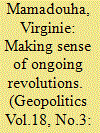

|
|
|
|
|
| Publication |
2013.
|
| Summary/Abstract |
Making sense of ongoing events is difficult for academics but a necessary exercise. The six books for review all address the events known as the Arab spring, Arab awakening, Arab revolt(s), Arab uprising(s), and Arab revolutions, that unfold after the self-immolation of Mohamed Bouazizi in Sidi Bouzid, Tunisia, on 17 December 2010. The different labels carry different connotations, be they bringing hope (spring, awakening), unarticulated mobilisations (revolt, uprising), or claims about results (revolution), while the
plural nuanced the sense of unity carried by the notion that the events in different Arab states were both linked together in a single historic moment and separated from other uprisings around the world. This separation is generally nuanced again by comparing the events to previous waves of uprisings, including the 2009 green movement in Iran, the 2005 Cedar revolution in Lebanon, the coloured revolutions in Serbia and former Soviet Republics in the 2000s, the 1989 movement ending communist rule in Europe, the 1974 Carnation revolution in Portugal, the 1968 students and civil rights movements, 1848, 1789 etc . . . . or the later urban movements like the Indignados and Occupy in 2011-2012.
|
|
|
|
|
|
|
|
|
|
|
|
|
|
|
|
| 17 |
ID:
090644


|
|
|
|
|
| Publication |
2009.
|
| Summary/Abstract |
Several Arab countries have recently manifested an interest in civilian nuclear energy. For some, like Egypt, this is the revival of an old interest, for others, notably the members of the Gulf Cooperation Council (GCC), it represents a clear reversal of previously held positions. This interest has been interpreted as an implicit threat to move in the direction of acquiring a military nuclear capability, in case Iran develops a bomb. Instead, the article argues that interest in nuclear energy has strong economic motivations for all Arab countries, although the position of the GCC is quite different from that of North Africa and Levant countries, from the point of view of both the cogency of motivation and the ability concretely and rapidly to launch a civilian nuclear program.
|
|
|
|
|
|
|
|
|
|
|
|
|
|
|
|
| 18 |
ID:
124887
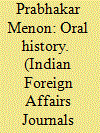

|
|
|
|
|
| Publication |
2013.
|
| Summary/Abstract |
Ambassador Prabhakar Menon served as advisor on foreign affairs to Prime Minister Shri P. V. Narasimha Rao when he was privy, on numerous occasions, to high-level interaction between our Prime Minister and his counterparts around the world. He had also served earlier as Director of the Foreign Secretary's office where again he was an eyewitness to some significant developments. In this conversation with the Journal, he recounts some of the events that shaped India's Foreign Policy postures - as he saw from close quarters (as the proverbial 'fly on the wall') during those two tenures.
|
|
|
|
|
|
|
|
|
|
|
|
|
|
|
|
| 19 |
ID:
123977


|
|
|
|
|
| Publication |
2012.
|
| Summary/Abstract |
If hostilities break out over any disruption of traffic through this busy sea lane, the Navy had better look long and hard at Iran's anti-access/area-denial capabilities.
|
|
|
|
|
|
|
|
|
|
|
|
|
|
|
|
| 20 |
ID:
146312


|
|
|
|
|
| Summary/Abstract |
The Saudis believe that this is the safest and only method to deal with the highly unstable regional neighbors steeped in contradictions. This explains why they paved the roads for the United States, their ally of long standing. In the majority of cases, Saudi Arabia allowed Washington to capture the initiative and pursue its own interests in the Middle East and accepted this.
|
|
|
|
|
|
|
|
|
|
|
|
|
|
|
|
|
|
|
|
|